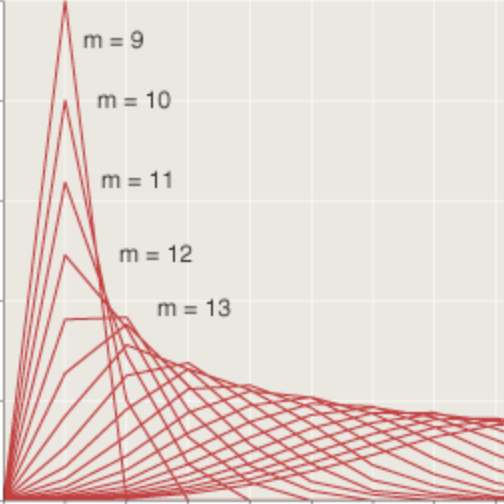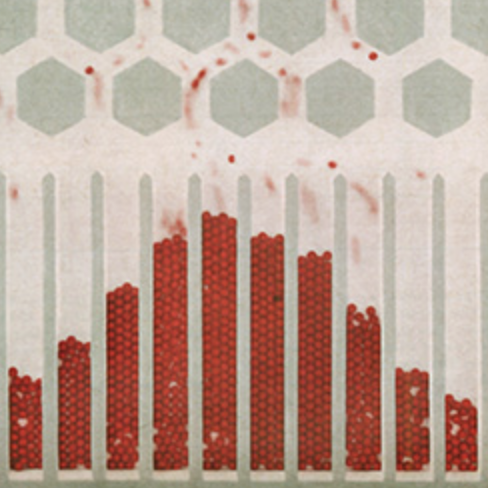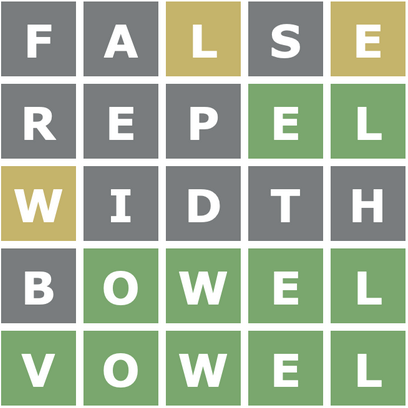Easy as abc
by Brian Hayes
Published 24 May 2007
It all starts with the equation a + b = c, which looks straightforward enough. Assume that a, b and c are positive integers that have no divisors in common other than 1; for example, the triple {1, 2, 3} meets this condition, and so does {4, 5, 9}.
Now let’s take the product of the three numbers abc, list all the prime factors of this product, and cast out any duplicates, so that each prime in the list appears just once. The product of these unique primes is called the radical of abc; it is necessarily a “square-free” number, one that cannot be divided by any perfect square. For the triple {1, 2, 3} the product is 1 × 2 × 3 = 6 and the prime factor list is (2, 3); since this list has no duplicates, the radical rad(6) is 6. In the case of {4, 5, 9}, the product is 4 × 5 × 9 = 180 and the factor list is (2, 2, 3, 3, 5). Removing the duplicated 2s and 3s leaves the unique factor list (2, 3, 5), so that rad(180) = 30.
Note that in both of these examples, rad(abc) > c. Can it ever happen otherwise? Can rad(abc) be less than c? Yes, it can. The triple {5, 27, 32} has the product 5 × 27 × 32 = 4320; it’s easy to see that the unique primes in this product are again (2, 3, 5), and so rad(4320) = 30, which is less than c = 32. Triples with this property are called abc-hits. There are infinitely many of them, and yet they are quite rare. Among all abc triples with c ≤ 10000, there are just 120 abc-hits.
If rad(abc) can be less than c, just how much less? Can we find an example where rad(abc) is so much smaller that the square of rad(abc) is also less than c? No one knows of such a triple, but there are some examples where [rad(abc)]α < c for some exponent α greater than 1 though less than 2. Take the triple {2, 6436341, 6436343}. Here b is equal to 310 × 109 and c is equal to 235, and so rad(abc) = 2 × 3 × 23 × 109 = 15042. And 15042α < 6436343 for any α < 1.6299.
So who cares? Number theorists, that’s who.
In 1985 Joseph Oesterlé of the University of Paris and David W. Masser of the University of Basel conjectured that there are only finitely many such exceptional triples. Given a positive number ε that can be made arbitrarily small, [rad(abc)]1 + ε can be less than c only in a finite number of cases (which will depend on ε). That’s the abc conjecture. Although it may seem like a rather arbitrary game with numbers, if it turns out to be true, there’s a long list of important consequences.
Why am I going on about this just now? A friend has passed along a rumor that we may soon hear big news about the abc conjecture.
Some resources:
- The ABC Conjecture Home Page, by Abderrahmane Nitaj
- The Amazing ABC Conjecture, by Ivars Peterson
- ABC@home, a project led by Hendrik W. Lenstra Jr., B. de Smit and W. J. Palenstijn
- The ABC Conjecture, a presentation by Frits Beukers (PDF).
- It’s As Easy as ABC, a Notices article by Andrew Granville and Thomas J. Tucker.
Update 2007-05-26: Time to lift the cloak of mystery. At a conference held last week at Columbia University, Lucien Szpiro of the City University of New York gave the last talk on the last day, and quietly let it be known that he had proved at least part of the abc conjecture. I’m grateful to Kevin O’Bryant for giving me an early heads-up on this news. There’s now a little more on Peter Woit’s blog.
Responses from readers:
Please note: The bit-player website is no longer equipped to accept and publish comments from readers, but the author is still eager to hear from you. Send comments, criticism, compliments, or corrections to brian@bit-player.org.
Publication history
First publication: 24 May 2007
Converted to Eleventy framework: 22 April 2025




Sorry about the clunky comment interface. Thanks for persisting.
I now face a quandary. If I correct the error you have discovered, then the text of the original posting will no longer mislead or confuse readers who come upon it anew. But when those readers come to your comment, saying that the relational operator is reversed, they’ll then look back to the text, and mentally reverse it again….
I guess we can only hope they’ll also read this comment.
The paragraph describing the abc conjecture (starting “In 1985″) seems to have a couple of problems:
1) I’m pretty sure you mean “> c”, not “
Let me try that again. (It would sure be nice if there was a “preview” button in the comment interface…)
The paragraph describing the abc conjecture (starting “In 1985″) seems to have a couple of problems:
1) I’m pretty sure you mean “> c”, not “< c”, in the actual statement of the conjecture.
2) I think you’ve got the quantifiers backward in your English text. I read the text as saying that there is a single set of exceptions that works for any positive epsilon, but I think the set of exceptions would have to depend on epsilon.